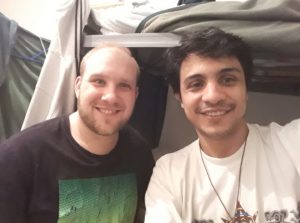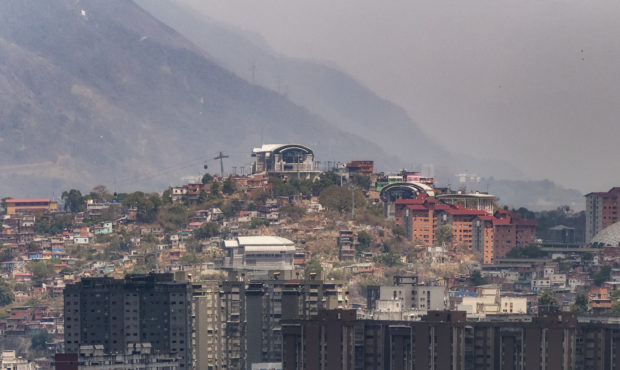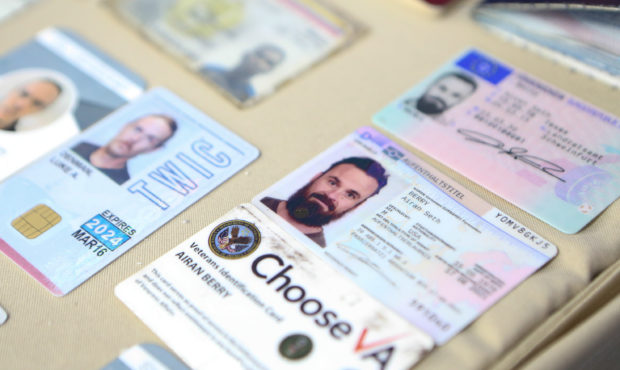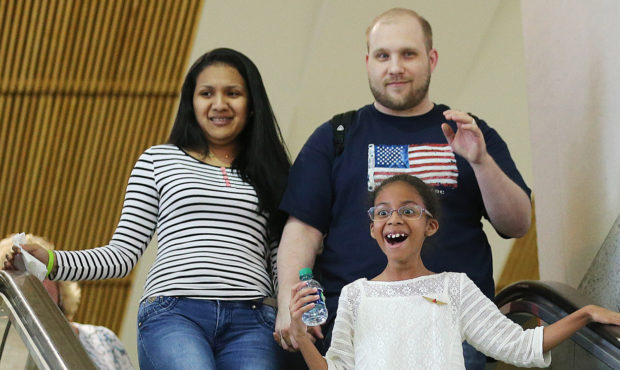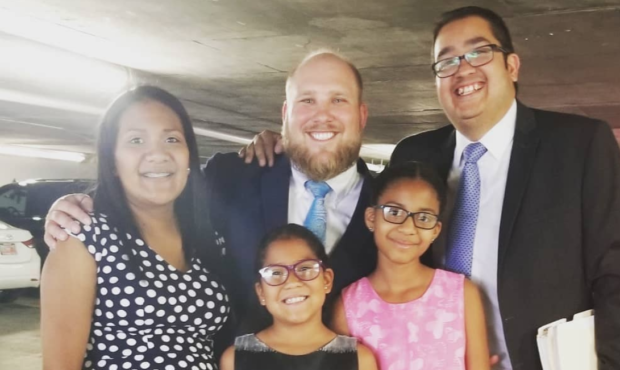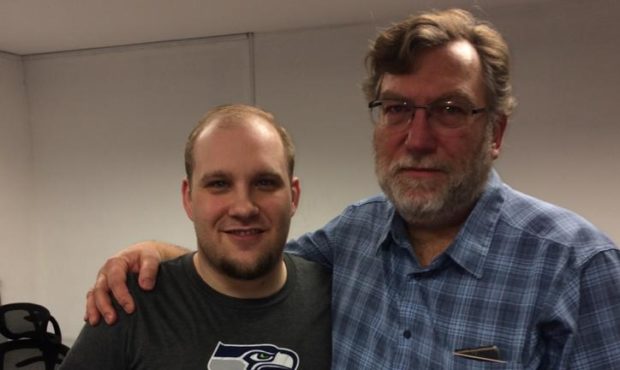New details revealed in the prison riot that threatened the life of Josh Holt
Jul 29, 2020, 12:10 AM | Updated: Dec 30, 2022, 11:22 am
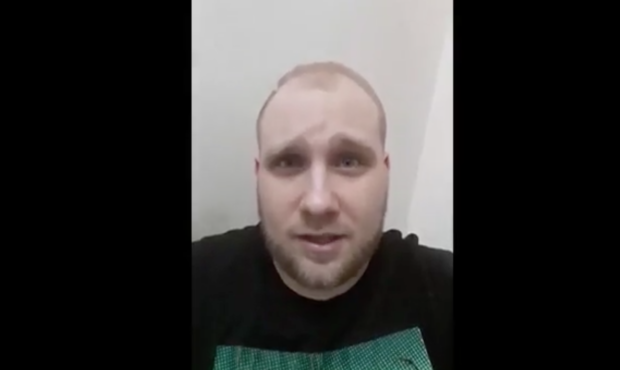
In this video, shared widely on social media, Josh Holt pleaded for his friends, family and government to intervene as inmates at El Helicoide threatened his life during a prison riot on May 16, 2018. Photo: Josh Holt
Editorial note: This is the latest in a series of articles related to the KSL Podcast, “Hope In Darkness.” Find all of our episodes and coverage here.
SALT LAKE CITY — The prison riot at Venezuela’s El Helicoide in May 2018 exposed a divide between the treatment of the country’s political and common prisoners even as it threatened the life of Utahn Josh Holt.
Video messages Josh Holt sent home during the prison riot rocked Utah and sent shockwaves throughout the United States. They brought renewed attention and urgency to the case. But until now, how the uprising began has not been explained. It’s the focus of episode 11 of the podcast, “Hope In Darkness: The Josh Holt Story.”
Political vs. common prisoners

Picture of El Helicoide, the headquarters of the Bolivarian National Intelligence Service (SEBIN), in Caracas, taken on May 17, 2018. (Photo by Juan BARRETO/AFP/Getty Images)
The divide between political prisoners and common prisoners at El Helicoide was both physical and metaphorical.
The building, a three-sided curved pyramid under a metal dome, is essentially a giant ramp on the inside. The cells extend on either side of the ramped hallway. Prison officials kept political prisoners above a locked gate, higher up the hallway than the common prisoners.
On the morning of May 16, 2018, because it was a visitation day, the gate between the common and political prisoners was open.
Several days before, a political prisoner named Gregory Sanabria claimed his roommate stole his WiFi device.
“He put that WiFi device into the window. That would give him and some other people WiFI connection to get onto the internet,” Josh Holt explained. “I actually had my own little WiFi … and mine didn’t get stolen, but his did. And so from that point on for the next couple of days, he was fighting with a lot of people.”
Sanabria’s roommate had connections to some common prisoners, who began to threaten him.
“There are certain prisoners that run that jail on the inside, and the guards just guard it from the outside,” Josh Holt said of the common prisoners in question. “You could kind of see this cell as being one of those… There were upwards of three, four people that would actually run that cell and tell people what to do, where to do it, money that they had to give and why they had to give it, whatever it would be. And two of those people that were leaders in that cell happened to be connected to this one person that Gregory was getting it into.”
A possible set-up
The disagreements simmered until visitation day, when, because the gate was open, common prisoners could access areas they couldn’t always use. Such as a room with free weights that the political inmates used as a gym.
According to Josh Holt, Gregory Sanabria was near the gym trying to buy cigarettes when the leaders of the cell positioned themselves in the same area.
“Gregory didn’t realize that they were there, and they ended up grabbing Gregory and throwing them in between two locked cell doors so that no one could come in and no one could go out,” he said. “They had one person holding the door so that Gregory was stuck.”
Gabriel Valles, a political prisoner and human rights activist, believes prison guards set Sanabria up for the severe beating. In his view, guards staged the scene and laid a trap for Sanabria so the common prisoners could exact their revenge.
Valles shared video to Instagram showing Sanabria’s injuries. Purple bruises covered half his face, with one eye swollen shut.
Protesting injustice
What happened to Sanabria galvanized the political prisoners.
“We saw Gregory for the first time and we were shocked,” Josh Holt said. “And that’s why all these political prisoners started to get very angry, because they weren’t being protected.”
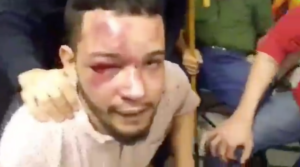
Cellphone video from inside El Helicoide documented the result of the severe beating of Gregory Sanabria, a political prisoner, on May 16, 2018. Screengrab from Instagram video posted by Gabriel Valles
Not only did they feel the guards weren’t protecting them — they saw Sanabria’s beating as proof the guards were actively working to put them in harm’s way.
There had been other instances of unrest among the political prisoners; according to Josh Holt, guards would lock the gates separating political from common prisoners until things settled down, which typically happened within a day.
The last straw
This time, the inmates would not settle down.
“When the other political prisoners found out that a political prisoner had been attacked, everything exploded,” Thamy Holt said. “There was an uproar because the political prisoners said that the SEBIN allowed this to happen, that we’re not taken care of, that we’re not protected.”
For many, it felt like the last straw.
“They weren’t getting their — their human rights that they were allowed, they weren’t getting their due process, they weren’t allowed to go to the doctor,” Josh Holt said.
“What rights did they want? To be taken to the hospital, because they wouldn’t take you to the hospital. You had to pay to go to the hospital. To be taken to court. You had to pay to get a ticket that said you needed to be taken to court at this day and time, you had to pay for everything,” Thamy Holt said. “So they wanted to reduce the corruption.”
Josh Holt decides to join the prison riot
Josh and Thamy Holt, who had stayed out of past disputes involving political prisoners such as hunger strikes, decided they could stay neutral no longer.
In the past, they feared their involvement would ruin their chances at freedom. But this time, they talked it over and felt like maybe they could make a difference.
“We were scared, we were nervous, we didn’t know what the outcome was going to be,” Josh Holt said. “But we decided it was time for us to fight for our rights.”
The Holts approached Valles and Lorent Saleh, another human rights activist.
Getting involved
A prison official, seeing them talking, scolded Josh Holt for putting himself in the middle of the dispute. The guard told the Holts it had nothing to do with them. Josh Holt said it absolutely had everything to do with them.
“And so from there, we started arguing more and more with the [guard],” he said. “But nothing was happening. And so we said, ‘You know what, if you’re not going to listen to me, we’re going to get everyone out of their cells.'”
Saleh, Valles and other political prisoners approached the area around the gym at the top of the hallway; some common prisoners remained gathered there.
“But what [the common prisoners] didn’t know was what just happened. They didn’t know that [the political prisoners] were upset with the people in the jail, officers, and the way that they were treating us. They thought that we were coming to them to fight them, because of what happened to Gregory,” Josh Holt said.
Prisoners united
The common prisoners looked ready for a fight.
“And I remember we all held up our hands into a circle to say, ‘No, we’re together.’ And when we united, when they came out of [the gym] and came towards us and we, we collided with them — it was just this crazy feeling of — everyone was just ready to let all their frustrations go,” he said.
Video posted to social media documents this part of the uprising. You can hear and see angry prisoners breaking out light bulbs and running loose in the prison’s long, curving hallway.
Video 1. Imágenes más temprano cuando iniciaba la protesta de los privados de libertad en el Sebin del Helicoide. pic.twitter.com/4X2y8IvVn8
— Daniel G. Colina (@danielgcolina) May 16, 2018
“I didn’t realize what we had done until we started going back and everyone started breaking doors, breaking glasses, breaking the computers, popping all the light bulbs,” Josh Holt said.
A volatile situation becomes threatening
Josh Holt went out and grabbed another friend for backup. Thamy Holt, worried for the safety of her cellmates, brought two more women with her and joined the two men in Josh’s cell.
The group pushed Josh Holt’s bunk bed up against the door, effectively locking the five of them inside.
“Everyone started attacking Joshua,” Thamy Holt said.
Inmates standing outside the barred door to the cell demanded Josh Holt come out.
“They said [Josh] was the guarantee of the situation, that guaranteed that the guards would not enter,” Thamy Holt said. “They threatened the officials, saying that if they came to enter the jail or the cell, or any nearby area that they might have access to us, [the inmates] would kill Joshua.”
“And the next thing I know, [the inmates are] saying, if I don’t come out now, that they’re going to come in, and that they were going to kill me, that they were going to throw my blood all over the walls,” Josh Holt said. “They wanted to hurt me and they wanted to show the police that they had me in their hands. If they had this beaten-up American that was bleeding with a knife to my throat,[they thought] that they could get that freedom. All they had to do was take me outside and show them what they had done to me.”
“I need the help of my people”
The Holts recorded video messages, posting them to Facebook, pleading for help.
“I don’t think I’ve ever been this afraid of my life. It’s completely different than — than at the very beginning [during my arrest] when you know, I was up against the wall and I had cops behind me pointing their guns at me. Because that lasted, you know, 20 seconds. This was a constant screaming, yelling, pounding,” he said.
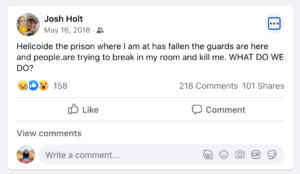
In a series of video and text messages posted to social media, Josh Holt asked for help from the United States and his friends and family during the May 2018 prison riot. Screen grab from Facebook
“They began to beat on the doors, to the point that they made a huge hole in the wall,” Thamy Holt said.
“A hole the size of a basketball,” Josh Holt added. “And they did that with just this little hand weight, pounding it on this brick in order to basically break out the lock on my — on my door to break it open and to get in.”
Thamy Holt tried to intervene.
“I confronted them, I told them, ‘You are not going to take Joshua. Do not disturb us! Look for something else to do,'” Thamy Holt remembered. “That is my mistake, because they would only get angrier.”
The attempt to break into the cell ultimately failed, because the brute force attack on the wall merely bent the metal frame of the door, which meant it could not open. Essentially, they barricaded the Holts and their friends inside their own cell.
Friendship pays off
Trapped inside their windowless cell, the Holts had no idea what to do.
“Luckily, I had made friends, and those friends came to save me,” Josh Holt said.

Left to right, El Buñuelo (Claudio Giovanni Jimenez Gomez), Josh Holt and Colombia (Leiver Padilla) in their cell at El Helicoide in 2016. Photo courtesy of the Holt family.
One of those friends was Leiver Padilla, nicknamed ‘Colombia,’ one of Josh Holt’s cellmates from earlier in his stay at El Helicoide. Colombia, controversially, faced charges in the murder of a rising star in Nicolás Maduro’s political party. The regime painted the slain National Assemblyman, Robert Serra, as a martyr for the Bolivarian revolution. Therefore, Colombia occupied a unique place in the prison: serving time for a “common” crime, with a potentially political bent; he had an audience with both types of prisoners.
According to Thamy Holt, Josh befriended Colombia when they were cellmates.
“Well, that good friendship works, so that this man protected Joshua in the midst of this riot,” Thamy Holt said. “He was one of those who said, ‘If someone touches The Gringo, they are touching me.'”
Colombia’s intervention both helped calm tensions and cement the two factions of prisoners in a common cause once again: the fight for human rights.
Human leverage
Now with the prisoners united in a common cause, they decided to use the Holts as leverage — this time, with their permission.
The prisoners moved the Holts from Josh’s cell to another location in the prison.
“They were afraid that the SEBIN was actually going to come through the roof of my cell to pick me, to get me out of it. Because they knew where I was at,” Josh Holt said.
The prison riot continued overnight and into a second day, as Josh Holt sent a new batch of videos out. This time, he explained he no longer felt threatened, but urged the American government to intervene. He pleaded for better conditions at El Helicoide for all inside.
“Before, you’d be very, very careful with the things that you say, the things that you publish [on social media],” Josh Holt said. “The guards would know that you had a cell phone. Well, now that we’re going through a riot, we knew that they were going to turn the whole side — the whole jail upside-down, and find everything that they could.”
In other words, the guards were going to find everyone’s phones anyway, so they might as well get as much out of them as possible before that happened.
Fears of reprisal
Word got out. Timing played a role: the prison riot in which Josh and Thamy Holt became involved began just days before Venezuela’s elections. At the same time conditions deteriorated inside El Helicoide, opposition leaders protested in the streets, hoping to draw attention to what they saw as unfair elections.
The political prisoners continued to demand their freedom; the common prisoners requested a transfer to another facility, one where they felt they’d receive better treatment.
“After fighting with them for a whole day and a half, [the common prisoners] were finally given permission to be moved to a new jail. And so everyone was super excited,” Josh Holt said.
“All the common prisoners were put on a red bus and taken out,” Thamy Holt said.
“There were over 70 people that left that day,” Josh Holt said.
Word from the outside world
With mostly political prisoners left inside, the mood inside El Helicoide changed. Josh and Thamy Holt and their fellow inmates could see news reports on their smartphones.
“And the Venezuelan government actually released some type of news stating that there were people inside of the SEBIN that were armed and that they were going to have to ‘take care of it,'” Josh Holt said.
They worried the police and guards would move in, shoot the remaining prisoners, and plant weapons with them to prove they’d been an armed threat. To a man whose wife and mother-in-law said they witnessed government officers planting a grenade in his suitcase, it didn’t seem that unrealistic.
Laying out the options
Thamy and Josh Holt moved slightly away from the larger group to talk about their options. If they survived, they surmised prison officials would separate Thamy Holt from Josh and send her to a women’s prison.
“Before making the decision to leave, the lawyer called me on the phone,” Thamy Holt said. “He called me on the phone and [said], ‘Look, Thamara, there is an offer for you if you decide to [leave] the riot. If he does not decide to participate in the rioting, there is an offer for you. We are going to take you out, but we need to know that you are going to cooperate.'”
Thamy Holt told the lawyer they were willing to surrender themselves as long as they could stay together.
The bait and switch
As soon as Josh and Thamy Holt went outside the prison to surrender to police, they saw dozens of common prisoners, handcuffed and kneeling on the ground.
The promised transfer never happened.
“They had a slogan: from SEBIN, you leave dead — or you don’t leave,” Thamy Holt said.
The experience of another of Josh Holt’s former cellmates demonstrates the possible truth of that statement. Claudio Giovanni Jimenez Gomez, a.k.a. Buñuelo, helped Josh Holt adjust to prison life. Lorent Saleh, Josh’s friend, told reporters after his own release that he witnessed Buñuelo’s murder inside El Helicoide.
Inmates saw a stay at El Helicoide as a possible death sentence. Now, for the common prisoners who’d hoped for a transfer, they once again faced that fear.
Valles, Saleh and most of the other political prisoners would eventually gain their freedom, but not that day. The uprising failed.
The Holts weren’t free yet, either. Guards took the couple to an office within El Helicoide where they would spend the rest of their time in prison.
Hope In Darkness releases new episodes weekly on Wednesdays. Subscribe free on Apple Podcasts, Google Play or wherever you listen to podcasts.


